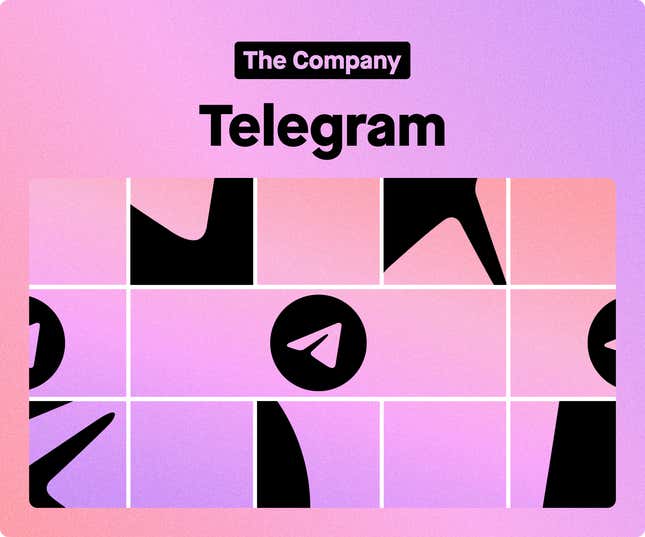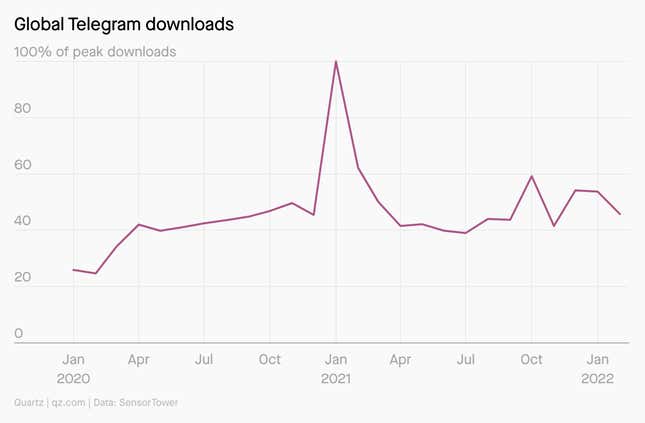
Hi Quartz members,
There’s one app where you can privately message confidantes away from the prying eyes of state spies, follow mainstream news outlets’ coverage of the war in Ukraine, and coordinate cyberattacks against Russian banks, oil companies, and government agencies. Telegram, a cross between a messaging app and a social media platform, has taken on an outsized role in the war in Ukraine.
In many ways, Telegram was made for this moment. Founder-brothers Pavel and Nikolai Durov fled Russia after wrangling with the Kremlin over data privacy on their previous venture, a Russian Facebook clone called VKontakte (VK). They built Telegram to ensure that users could communicate away from the surveillance and censorship of authoritarians like Russian president Vladimir Putin. Now, Telegram has become the app of choice for Ukrainians organizing the resistance against Putin’s invasion.
Telegram stands to benefit financially from the attention, new users, and righteous reputation it has gained during the Ukraine crisis. Since its 2013 founding, the app has proven nearly impossible to monetize, and its upkeep costs threaten to exceed the Durov brothers’ ability to self-fund it with their leftover VK profits. Last year, Telegram introduced ads and paid subscriptions, and reportedly began preparing to raise money through a stock listing in 2023.
But Telegram has plenty of questions to answer before it goes public. The app’s philosophical opposition to content moderation has made it a haven for jihadists, white supremacists, and conspiracy theorists of all stripes. And despite Telegram’s reputation for data security, privacy advocates have pointed out that messages on the app aren’t encrypted by default. Unless users go out of their way to change their message settings, information shared on Telegram is no more secure than it is on any other messaging platform.
By the digits
30: Programmers working on Telegram (based in Dubai, but also wandering the world, with stints in places like Paris, Singapore, London, and Bali)
63,404: Employees at Meta, the parent company of Facebook, Instagram, and WhatsApp
500 million: Total number of Telegram users, as of January 2021
25 million: Users who joined Telegram in three days after a controversial WhatsApp terms of service update in January 2021, according to Telegram founder Pavel Durov
<2%: Share of Telegram users in the US
$1.7 billion: Funds raised in Telegram’s record-breaking “initial coin offering” during a doomed cryptocurrency venture in 2018
Charting Telegram’s growth
Telegram tends to pick up users when its rival social networks stumble (like, for instance, when Facebook, Instagram, and WhatsApp went offline for six hours on Oct. 8, 2021). The app’s biggest growth spurt came in January 2021, when WhatsApp released a confusing update to its terms of service that made many users think—incorrectly—that the app would begin sharing the content of their WhatsApp messages with Facebook. That same month, Facebook and Twitter enraged right-wing users by banning Donald Trump for inciting a violent insurrection at the US Capitol.

Durov described the influx of tens of millions of new users as “the largest digital migration in human history.” Most of that growth came from outside North America and Europe.

Person(s) of interest

Brothers and Telegram co-founders Pavel (pictured above) and Nikolai Durov were born in St. Petersburg. Nikolai was a prodigy who as a teenager represented Russia at international math and programming competitions. Pavel studied philology at Saint Petersburg State University, where, as a hobby, he built discussion forums and digital libraries for classmates to share notes.
In 2006, inspired by Facebook, Pavel launched VK with two university classmates, and Nikolai joined soon after. The site quickly became the biggest social network in Russia. After Putin became president in a disputed election in 2011, Russia’s intelligence service demanded that VK block content from opposition groups. Pavel publicly refused “on principle.”
There are two versions of what happened next. In Pavel’s widely reported version of events, the Kremlin orchestrated a plot for a Russian oligarch to buy a controlling stake in VK and wrest away control. A more skeptical account laid out in an exhaustive Wired cover story contends that Pavel had a falling out with his co-founders, who ousted him. Either way, in 2014, after a three-year power struggle, Pavel and Nikolai left VK to work on a new app: Telegram.
A brief history of Telegram’s fundraising
2013: Pavel Durov self-funds the launch of Telegram, using the $300 million he earned at VK.
2018: Telegram raises $1.7 billion in an “initial coin offering” (ICO) for a planned cryptocurrency dubbed “grams,” the largest ICO of all time.
2019: The US Securities and Exchange Commission blocks Telegram’s ICO, essentially calling it a fundraising round in disguise. The company is forced to return $1.2 billion to investors and pay an $18.5 million fine.
March 2021: Telegram raises over $1 billion by selling five-year bonds to private investors, and uses some of the cash to finish paying back its cryptocurrency investors.
October 2021: Telegram launches an advertising program for public channels, but vows to never serve targeted ads.
November 2021: Telegram launches a paid subscription model to allow users to remove ads.
2023?: Telegram is reportedly planning to join the Nasdaq or Hong Kong Stock Exchange, either through an IPO or by merging with a special purpose acquisition company.
A platform for disinformation and dissent
Telegram’s libertarian developer team believes in the free flow of information with almost no restrictions. (There are two legally-mandated exceptions to that philosophy: Telegram removes channels that incite violence or spread child porn.) That ideological commitment has made the app a darling of dissidents and disinformation-peddlers alike.
Ukrainians have flocked to Telegram during the Russian invasion. Protesters in Hong Kong, Iran, and Belarus used the app to coordinate demonstrations against authoritarian rule. And Telegram has proved remarkably resistant to censorship efforts. When Russia tried to ban the app in 2018, the government managed to shut off the country’s access to nearly the entire internet—but Telegram kept itself online in Russia using a technique called “domain fronting,” which hides the app’s web traffic. Chinese state hackers were more successful in disrupting Telegram access during the Hong Kong protests in 2019, but still failed to block the app entirely.
The trouble is, Telegram has also created an unmoderated platform for some of the worst people on the internet. The app courted controversy in 2015 when the terrorist group ISIS began using public channels to spread propaganda. (Later that year, Telegram removed dozens of ISIS channels for inciting violence.) Telegram has also been used to spread the extremist manifestos of mass shooters from Norway to New Zealand. During the pandemic, it became a haven for anti-vaxxers booted from other social media platforms.
Recently, Telegram signaled its willingness to step up content moderation to protect its business. After Brazil briefly banned the app for failing to remove misinformation, Telegram committed to monitoring the 100 most popular public channels in the country and flagging false posts.
Keep learning
- Telegram: the app at the heart of Ukraine’s propaganda battle (The Guardian)
- How Telegram became the anti-Facebook (Wired)
- The fake news problem no one in India is talking about: Telegram (Quartz)
- Technology is changing the face of global protests (Quartz)
- The SEC killed Telegram’s $1.7B crypto project. Who’s next? (Decrypt)
- Telegram has a Nazi problem (Rest of World)
- South Korea’s latest sex crime scandal is a blackmail ring streaming abuse on Telegram (Quartz)
- A ban in Brazil got Telegram to reverse its position on content moderation (Quartz)
Have a secure end to your week,
—Nicolás Rivero, tech reporter (eschews WhatsApp, Signal, and Telegram in favor of the unhinged energy of messaging app Honk)
One 🤔 thing
Is Telegram really an “encrypted messenger”? Moxie Marlinspike, a privacy advocate and founder of the encrypted messaging app Signal, argues that Telegram doesn’t deserve the title. “[I]n terms of privacy and data collection, there is no worse choice,” he wrote on Twitter.
Unlike Signal and WhatsApp, Telegram doesn’t enable end-to-end encryption by default. That privacy protocol keeps messages secure by scrambling them into a secret code on the sender’s phone, and then unscrambling them when they reach the recipient’s device. That way, even if a message gets intercepted, it’ll appear to be pure gibberish.
Telegram users have to turn on a special “secret chat” feature to use encryption—and even then, it only applies to direct messages between two users, not group chats or private channels. As former Telegram developer Anton Rozenberg told Wired, “All your chats, except the secret chats, absolutely all groups, all channels, are stored on the Telegram servers. So Telegram has access to that information.”
In other words: If you use secret chats, Telegram can be a great privacy tool. But people who just use the default settings (and most people do) risk divulging secrets in unprotected chats.
